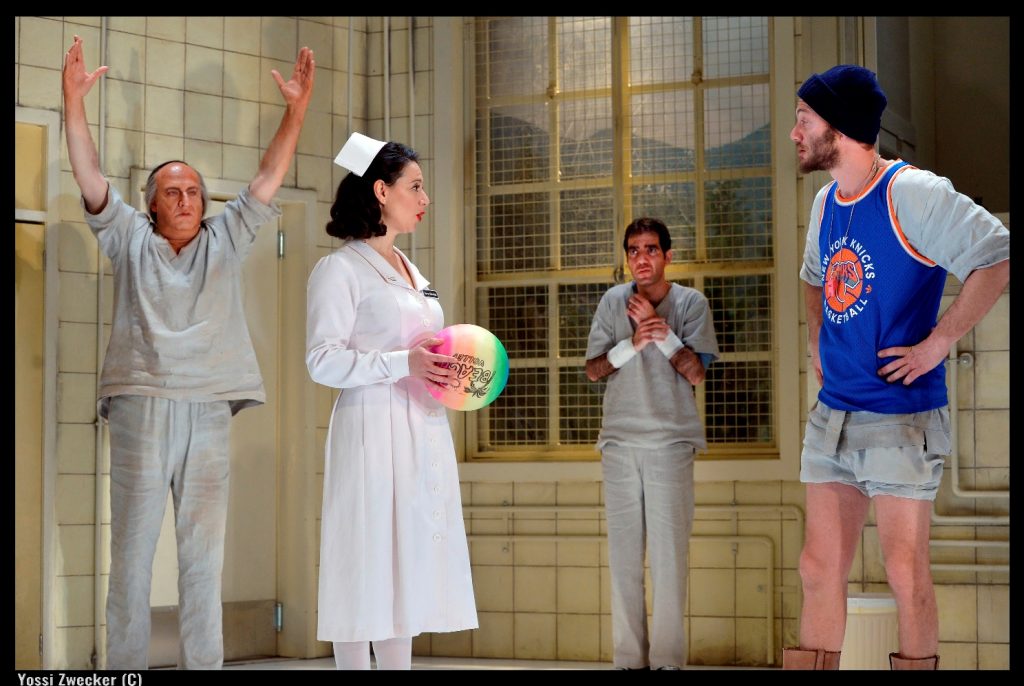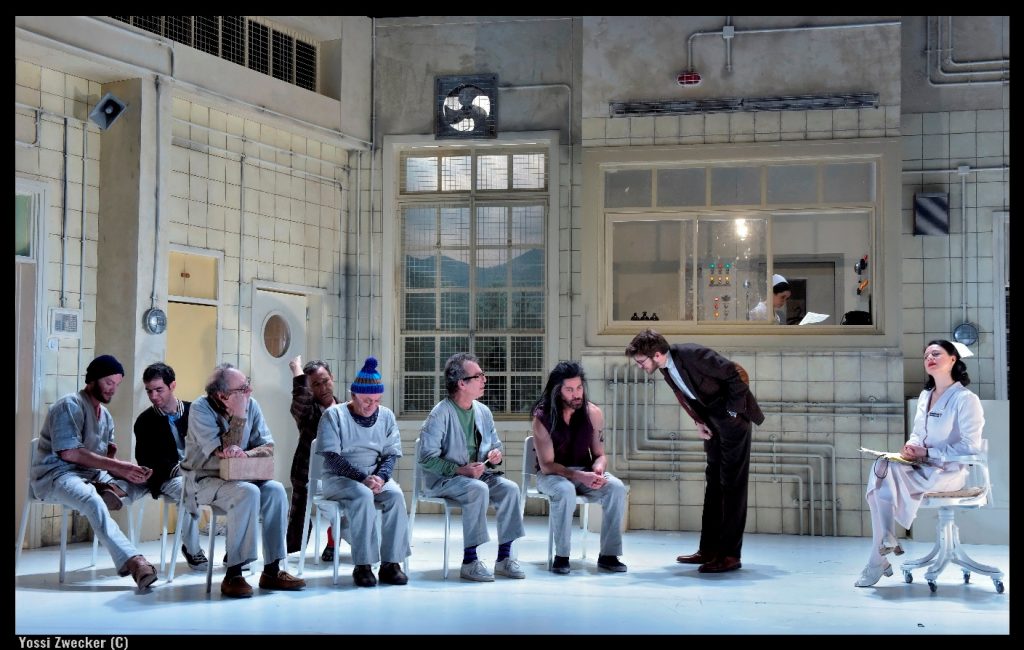
Ken Kesey’s One Flew Over the Cuckoo’s Nest is a literary masterpiece, a provocative harbinger of the changes taking place in American culture in the 1960s. Published in 1962, it was based in part on Kesey’s experiences working the night shift as an orderly at a mental institution, as well as his participation in early experiments with LSD. In questioning the living conditions, treatment, lack of individual freedoms and self-perpetuating nature of institutionalization, Kesey raised issues that reflected changing perceptions of mental illness. In its celebration of individuality and freedom, with its challenge to prevailing authority and the values of conformity, it reflects the spirit of that era. The Cameri production, directed by Omri Nitzan, emphasizes these themes, opening with a video sequence featuring John Lennon’s famous critique – “Our society is run by insane people for insane objectives” – a comment that would work well as the play’s alternative title. Lennon’s quote is interspersed with scenes from the turbulent 60s, with Beethoven’s Symphony No. 9 as ironic accompaniment.
“Power to the people” was one of the popular slogans of the 60s and what is at stake in One Flew Over the Cuckoo’s Nest is power. Nurse Ratched (Ola Schur Selektar) rules the psychiatric ward with cruel and subtle manipulation under the guise of benevolent care. Every sentence she utters, every aspect of daily life in the ward is calculated to assert her control. Selektar imbues the role with horror, as the even, modulated tones of Nurse Ratched’s voice deliver veiled threats and thinly disguised put-downs, while her visage remains placid and serene. The arrival of a new patient, Randle Patrick McMurphy (Oz Zehavi), threatens to disrupt the imposed calm of her domain.
Dale Wasserman created a stage adaptation of Kesey’s novel in 1963, yet it is Miloš Forman’s 1975 film version that became a cultural landmark. Louise Fletcher and Jack Nicholson’s portrayals of Nurse Ratched and Randle McMurphy are imprinted on the cultural consciousness. One cannot do better; one can only do something different. In this sense the pairing of Ola Schur Selektar and Oz Zehavi works very well. Selektar is softer in appearance and demeanor than Louise Fletcher. Nitzan has chosen not to make Selektar look more severe, but rather, on the contrary, her bright red lipstick stands in stark contrast to the pristine white of her nurse’s uniform, with a suggestion of repressed sexuality. This effect is heightened in the encounters and clashes between Ratched and McMurphy. Oz Zehavi cannot match Nicholson for tough and crazy, but his portrayal of McMurphy exudes an irrepressible sensuality and sexuality. When the sparks fly between the formidable Nurse Ratched and the unruly McMurphy, the power struggle has definite sexual undertones, a reminder of the sexual revolution of the 1960s, and the shift in perception to erotic desire viewed as a natural part of the human experience, rather than urges which should be repressed and controlled.
The soundtrack created by Rotem Carmeli is another one of this play’s strengths. Evoking the era with songs from the late 60s/early 70s such as Richie Havens’ Freedom, The Rolling Stones Sympathy for the Devil, and Gil Scott Heron’s The Revolution will not be Televised, the music echoes the play’s themes and underscores the prophetic aspect of Kesey’s work. Adam Keller’s set, with its dingy, pale yellow tiles, exposed pipes, barred windows, and protected nurses’ station set on high, is not only the perfect backdrop to the play, but a commentary on institutions, a design that makes a strong statement of its own.

Running at about two hours, the play does feel somewhat long, particularly in scenes whose purpose is primarily to establish the mood, characters, and reiterate the play’s themes. The resulting sense of repetition detracts somewhat from the energy of the production, yet this is redeemed by excellent performances from the entire ensemble cast. Itzhak Hezkia poignantly conveys Scanlon’s vulnerability and explosive aggression, and Shlomi Avraham provides some of the play’s most moving moments in his portrayal of the insecure, stuttering, Billy. Eran Sarel delivers a powerful performance in a complex role as Chief. Perceived as deaf and mute, Chief is the focal point for the sadistic aggression of the ward’s orderlies, Warren (Ziv Klayer) and Williams (Asaf Solomon), which he accepts with apparent docility. Without uttering a word, or any revealing gestures, Sarel conveys that Chief, who is always present, is a sensitive, perceptive, witness to the injustices that take place on the ward, seething with thoughts and feelings, a volcano ready to erupt.





